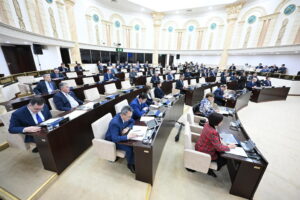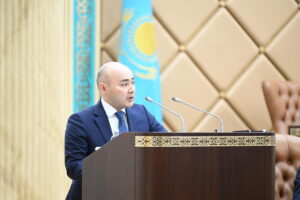ASTANA – Minister of National Economy Alibek Kuantyrov outlined measures to improve the country’s investment policy amid a decline in global foreign direct investment (FDI) flows at a May 29 meeting of the Senate, an upper chamber of the Kazakh Parliament, reported the ministry’s press service.

Photo credit: Senate’s press service
According to Kuantyrov, the gross FDI inflow in Kazakhstan reached $28 billion in 2022, a record-high since 2012. Investments in fixed capital increased by 8% in real terms. Foreign trade turnover increased by 32% and reached $134 billion.
Addressing the Senate, Kuantyrov described the government’s plans to attract investment. This year, according to the plan, 18.3 trillion tenge ($41 billion) will be invested in fixed assets, which is 22% more than last year.
The state has expanded measures to support small and medium-sized businesses and plans to adopt a comprehensive plan for entrepreneurship development this year.
“To develop the manufacturing industry, the list of activities for providing support has been expanded by 116 points,” said Kuantyrov.
In June last year, Kazakhstan approved a new Investment Policy Concept until 2026 to create a new investment cycle and revise the investment attraction policy, taking into account new trends, including environmental, social, and governance standards.
The current legislation outlines a wide range of state support measures to facilitate investments, including exemption from taxes and customs duties, and in-kind grants.
Based on the results of a large-scale audit to identify excessive requirements for business, more than 10,000 requirements have been removed in the legislation this year.
The main emphasis is placed on transparency and fairness of the tax policy. Tax administration will be revised with full digitalization of tax control.

Alibek Kuantyrov. Photo credit: Senate’s press service
Kuantyrov also mentioned the four main trends in global investment activity identified by international experts.
“The first is a 24% decline in global FDI flows. The main factors for reduced volumes are geopolitics and economic and financial conditions in the world. The fall is observed in all key economies,” Kuantyrov said.
The second trend is the fragmentation of the global investment market. According to him, the geopolitical proximity between the countries plays a greater role in investment decisions today, rather than geographical proximity.
“This is due to geopolitical conditions that lead to the relocation of capital from unfriendly countries to friendly ones. In such a situation, developing countries (recipients) are more vulnerable than countries with developed economies,” he noted.
The third trend is the diversity of investment policies depending on the level of economic development. Around 113 measures taken by developed countries limit investments, inflows and outflows.
“This is largely due to sanctions and counter-sanctions measures. The situation is reversed with developing countries – 95% of the total number of measures taken by them stimulate the inflow of investments,” the minister said.
Kuantyrov pointed out that the sectoral structure of investments has changed. Investments in the oil and gas industry, for example, have increased amid geopolitical conditions.


